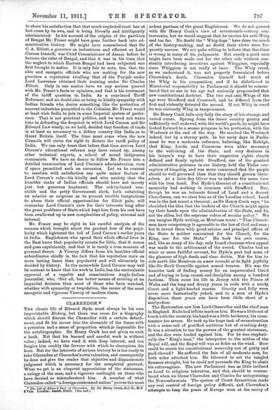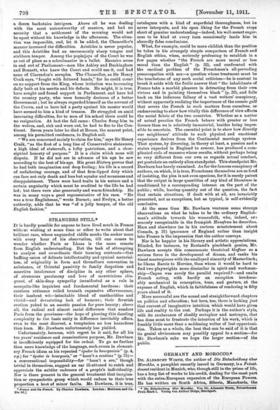CLARE ND ON.*
Tim classic life of Edward Hyde must always be his own imperishable History, but there was room for a biography which should discuss the Chancellor with a certain detach- ment, and fit his career into the chronicle of the times with• a precision and a sense of proportion which is impossible for the autobiographer. Sir Henry Craik has not given us such a book. Not that his learned and careful work is without value ; indeed, we have read it with deep interest, and can forgive him readily the fervour with which he champions his hero: tut for the interests of serious history he is too ready to take Clarendon at Clarendon's own valuation, and consequently be does not give the reader that objective and dispassionate judgment which is necessary for the completed portrait. What we get is an eloquent appreciation of the statesman, a eulogy of the man, and a vigorous onslaught on those who have decried or misunderstood him. A member of what Clarendon called "a foreign contemned nation" proves the most • The Life of Edward Earl of Clarendon. By Sir Henry Craik, If..0 B., 111...P !Vols. Londen: FicUr. [ILL net.]
ardent partisan of the great Englishman. We do not quarrel with Sir Henry Craik's view of seventeenth-century con- troversies, but we would suggest that he carries his anti-Whig zeal too far. No doubt the " Whig dogs " have done too much of the history-making, and no doubt their views were fre- quently narrow. We are quite willing to believe that Gardiner is wrong in many of his judgments. But surely a good case might have been made out for the other side without con- stantly introducing invectives against Whiggism, especially since Whiggism is not really at issue. The Whig creed, as we understand it, was not properly formulated before Clarendon's death. Clarendon himself had much of the Whig in his composition, and if he disbelieved in Ministerial responsibility to Parliament it should be remem- bered that no one in his age had seriously propounded that new constitutional doctrine. The two real anti-Whigs of the age were Strafford and Cromwell, and he differed from the first and violently detested the second. If not Whig in creed he was curiously Whig in temperament.
Sir Henry Craik tells very fully the story of his strange and varied career. Sprung from the lesser country gentry and sufficiently well endowed with the world's goods, he might have looked forward to a serene progress in his profession, with the Woolsack at the end of the way. He reached the Woolsack indeed, but by a stormy path. In his early days in Parlia- ment be was a moderate reformer, believing, like Raleigh, that King, Lords, and Commons were alike necessary to the well-being of the State, and very desirous in his lawyer's way to have their respective rights clearly defined and firmly upheld. Strafford, one of the greatest administrative geniuses in our history, held the Tudor con- ception of kingship, and was more concerned that the people should be well governed than that they should govern them- selves. At a later day Oliver was to enforce the same view with his iron hand. But Hyde's theories of a constitutional monarchy had nothing in common with Strafford. Nor, though he was an intimate friend of Laud and a devout Churchman, can we class him as of the Laudian school. Laud was in the last resort a theocrat ; as Sir Henry Craik says, " he cherished the idea that the leaders of the Church might again lay their hands upon the administration of the State, and be, not the allies, but the supreme rulers of secular policy." We can imagine Hyde writing, as Montrose wrote : " That Church- men have competency is agreeable to the law of God and man ; but to invest them with great estates and principal offices of the State is neither convenient for the Church, for the King, nor for the State." He took his own course, and, like so many of his day, only found clearness when appeal was made to the arbitrament of the sword. Charles had no wiser or more faithful servant, for Hyde's part had none of the glamour of high deeds and clear duties. Not for him to ride north like Montrose on anew crusade or to fight joyfully like Sir Bevil Grenville against armed treason. His was the humbler task of finding money for an impoverished Court and of trying to keep reason and discipline among a hundred factions. Then came his life in Jersey with the Prince of Wales and the long and dreary years in exile with a needy Court and a light-headed master. Gravity and folly were never more fantastically yoked, and to a man of Hyde's disposition those years can have been little short of a martyrdom.
The Restoration saw him Lord Chancellor and the chief man in England. Exile had leftits mark on him. Hewasa littleout of touch with the country, his hand was a little too heavy, his coun- tenance too severe. He took up the huge task of reconstruction with a sense not of gratified ambition but of crushing duty. It was a situation to tax the powers of the greatest statesman, and the dice were loaded against him. For he was emphati- cally the " King's man," the interpreter to the nation of the Royal will, and the Royal will was as fickle as the wind. How could he create his constitutional monarchy out of putty and pack-thread P He suffered the fate of all moderate men, for both sides attacked him. He laboured to set the tangled finances straight, but he could not persuade the King to abate his extravagance. The new Parliament was as little inclined as Land to religious toleration, and this should be remem- bered when we blame Clarendon and Charles for antagonizing the Nonconformists. The system of Court favouritism made any real control of foreign policy difficult, and Clarendon's attempts to keep the peace of Europe were at the mercy of
a dozen backstairs intrigues. Above all he was dealing with the most untrustworthy of masters, and had no security that a settlement of the morning would not be upset without his knowledge in the afternoon. The situa- tion was impossible, and, let it be added, the Chancellor's manner increased the difficulties. Aristides is never popular, and this Aristides bad an uncommonly sharp tongue and stubborn temper. Among the popinjays of the Court he was as out of place as a schoolmaster in a ballet. Enemies arose in and out of Parliament—men like Ashley and Buckingham and Bennett, who knew the Court and could use it, and had none of Clarendon's scruples. The Chancellor, as Sir Henry Craik says, "fought with fettered hands," for he could count on no support from the King, whose irritation was increasing daily both at his merits and his defects. He might, it is true, have sought and found support in Parliament, and have led the country party, who were honestly desirous of a better Government ; but he always regarded himself as the servant of the Crown, and to have led a party against his master would have seemed to him a kind of treason. He struggled on amid increasing difficulties, for to men of his school there could be no resignation. At last the fall came : Charles flung him to the wolves, and, sick and worn out, he had to flee to the Con- tinent. Seven years later he died at Rouen, the nearest point, among his permitted residences, to English soiL " We are concerned mainly to claim for him," says Sir Henry Craik, "as the first of a long line of Conservative statesmen, a high ideal of statecraft, a lofty patriotism, and a clear- sighted honesty of purpose." It is a claim which none will dispute. If he did not see in advance of his age he saw according to the best of his age. His great History proves that he had both imagination and deep feeling; his life is a record of unfaltering courage, and of that firm-lipped duty which can face not only death and loss but squalor and meanness and disappointment. There were hard traits in his nature and a certain angularity which must be credited to the life he had led; but there were also generosity and warm friendship. He was in many ways a good representative of his race. " He was a true Englishman," wrote Burnet ; and Evelyn, a better authority, adds that he was "of a jolly temper, of the old English fashion."



















































 Previous page
Previous page